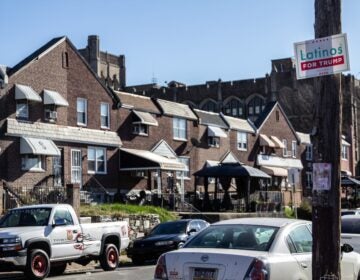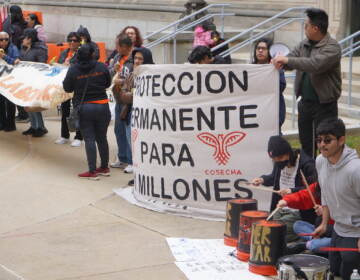Worker-owned businesses promise better pay, but not everyone can afford to be the boss
Worker-owned businesses promise better wages, but for some of the workers who could benefit the most in Philly, being the boss is close to impossible.
Listen 4:32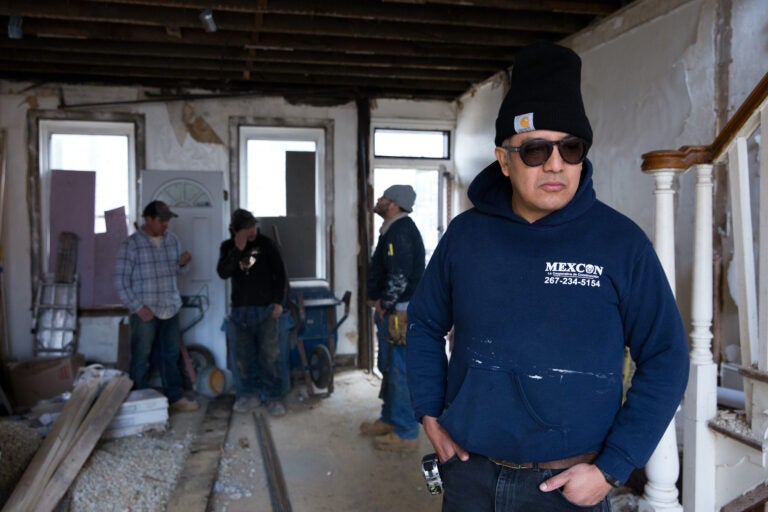
Javier (right) surveys the progress that his employees have made at a job site in South Philadelphia on Jan. 10, 2020. (Photo by Rachel Wisniewski)
Roughly a year ago, as Javier Garcia Hernandez grabbed supplies from a South Philadelphia hardware store, all he could think about was how to make the holidays better for the men of MexCon. Javier technically owns the construction company, but likes to joke that he’s merely the secretary of the group and the men are his boss.
“I’ll Be Home for Christmas” played faintly over the loudspeakers as Javier remembered sitting in a parked car at the South Philly Walmart with some of the company’s employees on Christmas of the previous year.
“We were so broke. There was about five of us, the five best friends, we put our change together and we had enough to buy a chicken and some bread and then a case of beer,” said Javier. “We just sat over by the river in the car and drank beer and ate chicken — that was our dinner. That was sad. It bothers me, I don’t want to do that again.”
Money was once again tight during the 2019 holiday season, and in a few months the pandemic would make the finances for the men of MexCon much worse.
As COVID-19 cases began to surge in Pennsylvania, Gov. Tom Wolf and his administration introduced sweeping business restrictions in an effort to curb the spread of the virus. Most construction screeched to a halt in late March.
The shutdown lasted roughly a month. One of MexCon’s most-touted characteristics — the fact that it’s run by undocumented workers — became one of its greatest vulnerabilities. MexCon employees had no federal or local support to fall back on. They did not get a $1,200 stimulus check like so many other people also affected by the pandemic, nor did they qualify for unemployment or rent assistance.
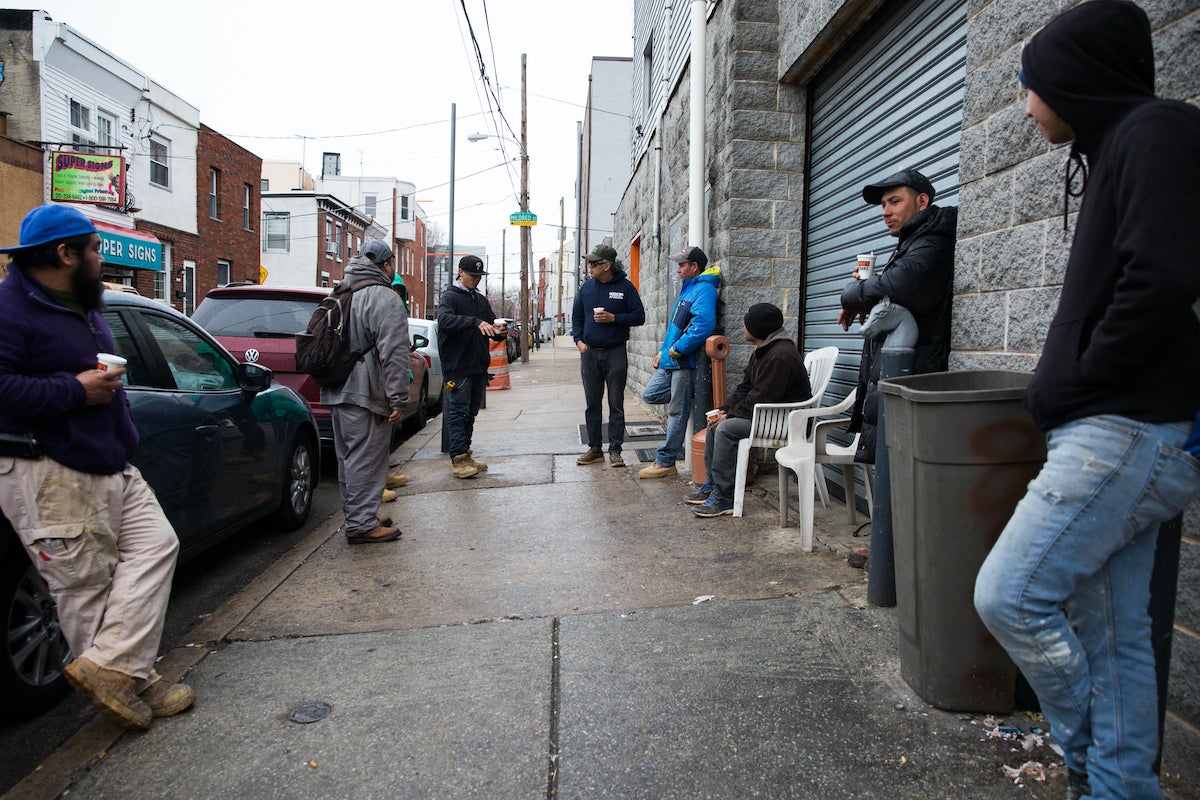
“We were able to hide and do some work,” said Javier of how some of the MexCon employees took jobs under the table during the shutdown to survive. “Being undocumented immigrants, we’re always somehow hiding. We’re an underground economy. So we were able to keep working, many of us.”
Still, 2020 has made Javier and some of his colleagues mull over how to best protect themselves in the event of another construction shutdown, and how to improve their quality of life longer-term, even after a vaccine is widely available.
The solution, Javier says, is to create a worker-owned development company, also known as a worker cooperative. Instead of doing the bulk of the construction work so someone else can make a profit, MexCon would become the housing developer. A core group of the business’ 40-something employees would invest in buying a property and hire their own men to do the work of rehabbing or building a house from scratch on their lot, then the men could sell the home — they’d control the entire process.
“If we were to say OK, ‘We do the style on this house, but we own the house,’” said Javier, “we’re not only going to get paid for the service, but we’re also going to make a profit if we sell this investment.”
Worst-case scenario, says Javier, if the housing market takes a nosedive, employees could live in the home themselves.
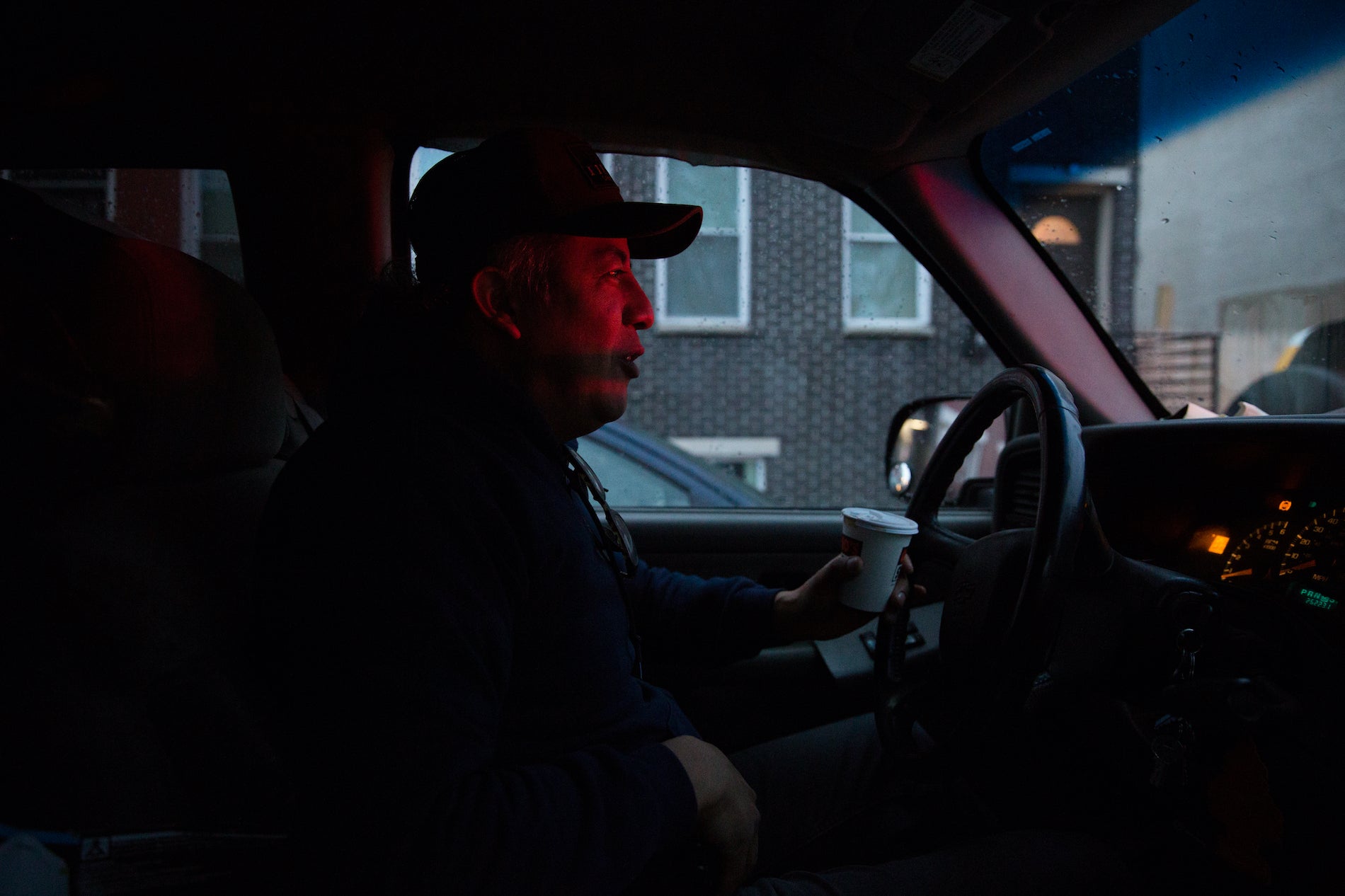
A strategy to reduce poverty
Cities and workers across America have taken an increasing interest in the worker-owner business model as a way to address inequality.
Jamila Medley, executive director of the Philadelphia Area Cooperative Alliance (PACA), a nonprofit that helps co-ops launch in the region, says the promises of the worker-owner model are big in a city with such a high poverty rate.
“We’re thinking about the cooperative business model as a strategy for helping to reduce poverty, to close the racial wealth gap in and around Philadelphia, and really thinking about how the business model could be used across various needs,” she said, pointing to some promising data gathered by the U.S. Federation of Worker Cooperatives (USFWC).
A 2019 USFWC survey found 106 of the known 465 co-op businesses in the country offered workers an average of $19 an hour. These businesses span across a variety of industries including child care, professional services, retail and home care.
In 13 of the states with the highest concentration of worker co-ops, that hourly rate exceeded the minimum wage by more than $7. And worker-owners reported receiving an average of $8,200 a year in their share of profits.
The majority of worker-owners are women and people of color.
Cities have tried to support the creation of these worker cooperatives in different ways. Back in 2014, New York City approved over $1 million in funding to connect new and existing worker co-ops to loans and logistical support. Between the 2017 and 2019 fiscal years, NYC helped launch more than 130 worker cooperatives, according to its own data.
Boston’s 2017 co-op initiative loaned money — $150,000 in the case of one business — to a handful of businesses and also helped them with administrative tasks.
Financial support for Philadelphia’s co-op economy has been more modest.
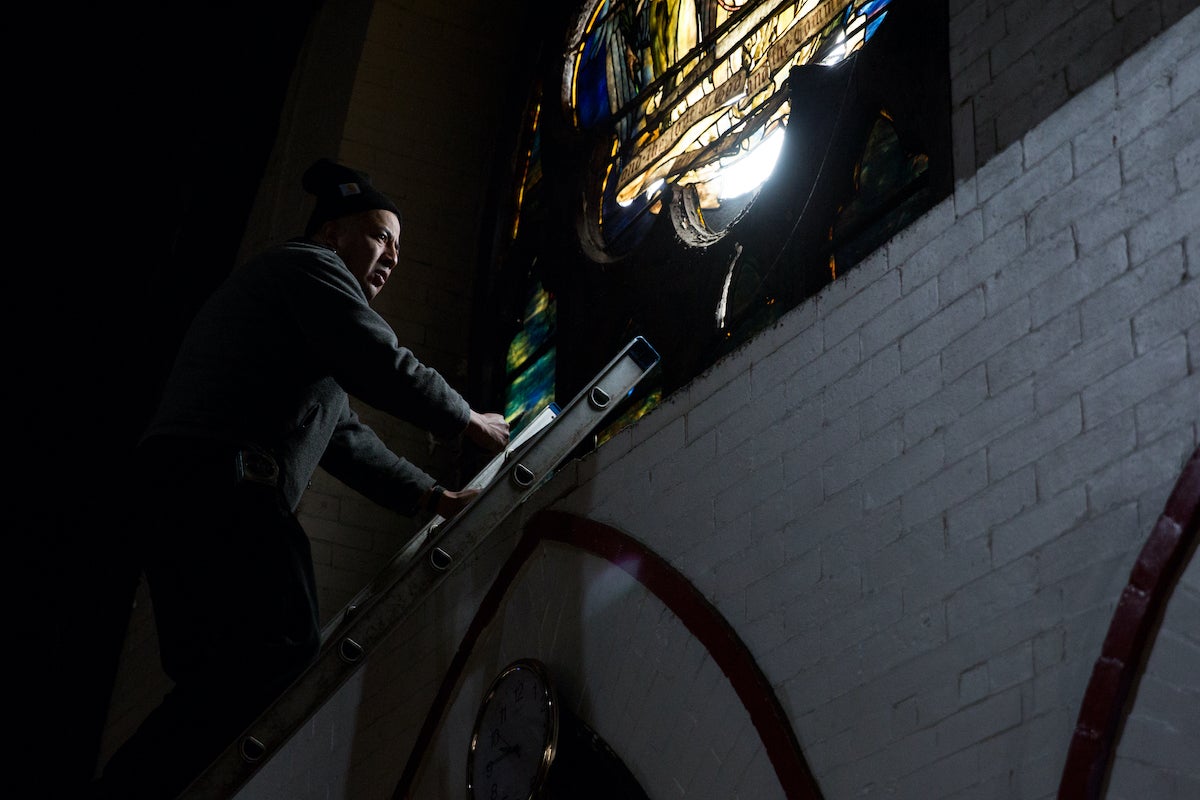
In 2016, with a $146,000 Knight Foundation grant, PACA helped MexCon and 19 other Philadelphia groups learn what it takes to run a co-op. It wasn’t until 2018 that City Council set aside $75,000 to help budding cooperatives establish themselves. PACA won that contract and continued to help companies with the creation of a worker coop.
“Some employees are like, ‘Actually, no, I don’t want the responsibility of ownership. That sounds like a lot. I’m good right where I am,’” said Jamila.
When MexCon went to PACA in 2016, the group ultimately couldn’t get past the conversation of financial investment.
Spending money to make money
Javier’s instincts tell him the reason many men within the company’s ranks are reluctant to take on more responsibility is that many still see their stay in the U.S. as only temporary.
“I think we all came, I know I came, under the illusion that I come here for a year and make some money and go back,” said Javier, who after 20 years in the U.S. has finally dropped the notion he’ll return to his native Mexico.
But Javier acknowledges he’s in a unique position. He’s the father of a toddler, he’s mastered English and graduated from the University of Pennsylvania (though he owes the school tuition and doesn’t have the actual degree), he has hobbies, and perhaps most importantly, he is a legal resident here.


Santiago, for example, Javier’s best friend and one of the co-founders of MexCon, has been in the U.S. for almost a decade — we’re not using his last name because he is undocumented. Santiago sends most of what he makes to his family back in Mexico, though he says he’s able to keep enough to live comfortably in the U.S. He lives in a home he likes and his landlord gives him a discount on rent because he helps fix up the property.
According to Javier, a lot of the men take a much more frugal approach to living in the U.S. because they’re planning to return home as soon as they have enough saved to start a business or buy a house in their native country.
The reluctance to accept that these goals might require long-term stays in the U.S. makes it harder to convince men to think about investing in a business model that wouldn’t turn a profit right away.
“We live paycheck-to-paycheck,” said Javier. “We’d be lucky we have money to buy lunch. Right now, we haven’t been able to say, ‘All right, I save $500.’ Because as soon as these guys get $500, boom — [they go to] Guatemala, Mexico, Honduras.”
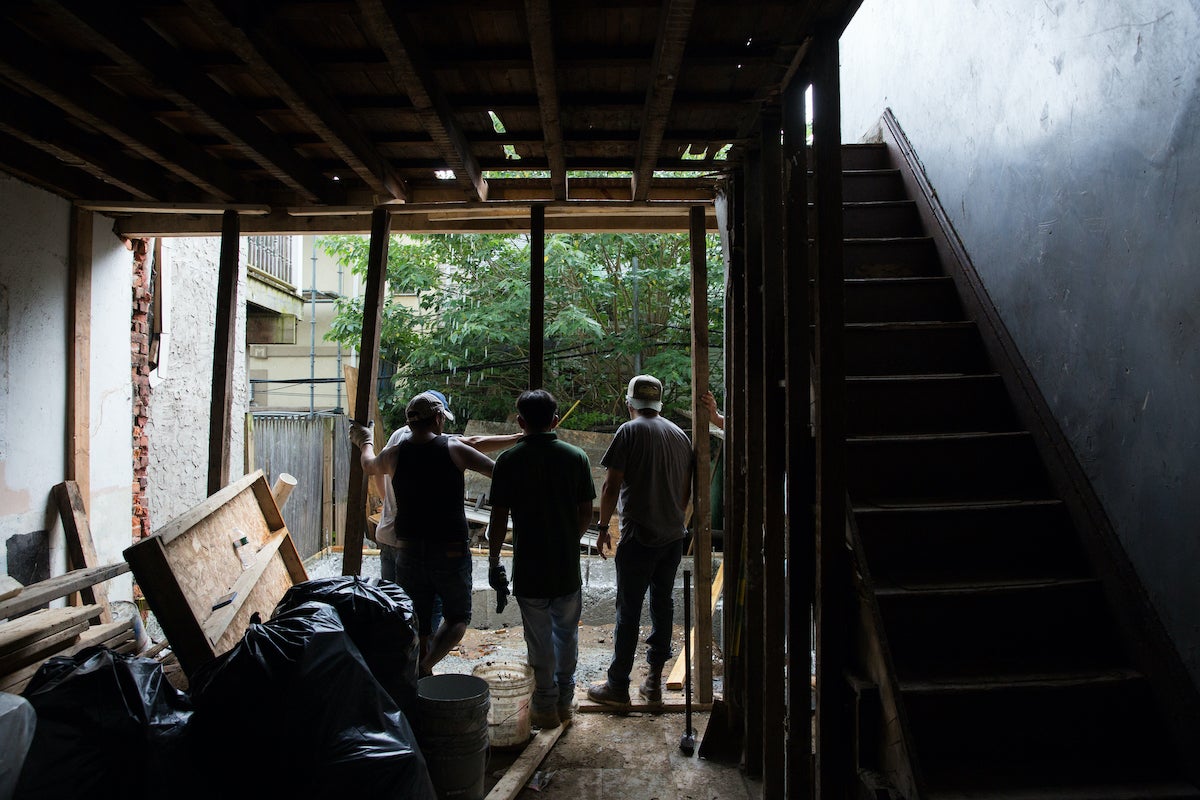
A race to the bottom
The spring construction shutdown was an eye-opening experience for Javier and Santiago.
The men founded MexCon in 2014 in the pursuit of better working conditions. While it isn’t officially a co-op, the company has been democratically operated since its inception. Every worker gets a vote in scheduling and which jobs the company takes on. Another benefit of being a worker-owner is no longer having to tolerate the abuse Javier and Santiago used to face from employers years ago.
More often than not, says Javier, site managers would hurl belittling and “derogatory names” at Hernandez and his coworkers — these had little to do with the quality of their work.
“He was lucky we didn’t beat him up,” Javier said of one particularly nasty manager.
The men were treated like punching bags — cursed at and berated — over any construction snag, like weather or an inspection delay, even though those were beyond employees’ control, says Javier.
“This guy would come in and yell at us throughout the day,” said Hernandez, who added the smaller, more timid workers got the brunt of the abuse.
“We didn’t last more than 2, 3 weeks, maybe a month, but we just quit,” said Hernandez. One day we told the guy off and I said, ‘Who wants to come? We’re leaving.’”
It was a bold move. When working for a contractor, the group didn’t have to go on a daily hunt for work. Striking out on their own meant taking chances their clients may be just as abusive and then not pay in the end. But Santiago and a handful of others followed Hernandez. In less than a month, MexCon, their own construction company, was born.
The company logo is a luchador mask. The workers say they’re like those Mexican wrestlers on television because people see their work, but not the person behind the mask.
From the start, the company has rolled with the punches.
None of the men owned a car at the time of the launch, so MexCon used bikes to transport bags of concrete, ladders and other tools to small work sites.
The actual running of the office proved to be a much larger challenge. No one in the group had ever run a business before 2015. The group came up with the company logo before it even opened a bank account for the business.
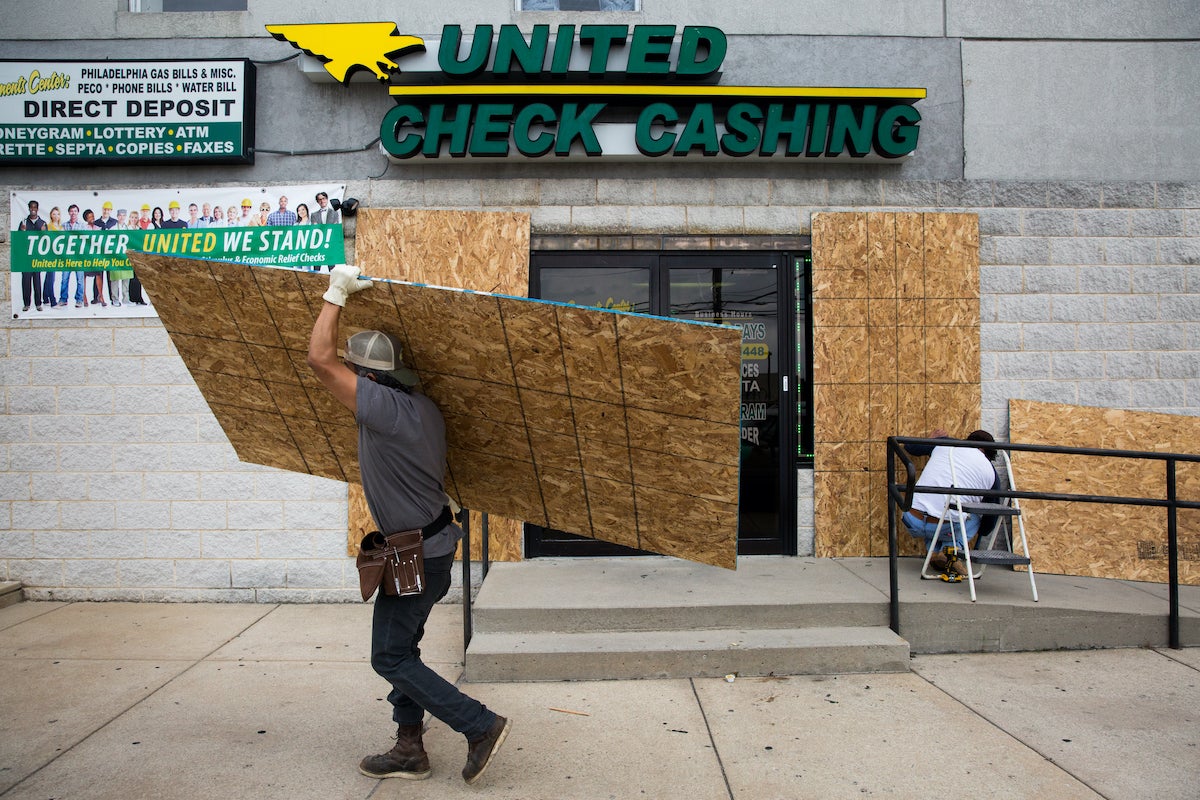
“It’s like, holy s–t, we got a check for MexCon, but we have no bank account,” said Javier of the first time a client wrote out a check for the group. “I got a check for five thousand dollars [made out] to MexCon. And I said, I can’t cash this check.”
The banking oversight was an easy enough fix but it turns out, owning your own labor is not enough to avoid abuse.
“It’s really nasty out there with what I see with these developers,” said Hernandez. “They take advantage of one contractor and then when the group realizes, ‘Hey, I’ve been taken advantage,’ they find another contractor they can take advantage of.”
Clients have also used the pandemic as an excuse to avoid payment. One developer skipped out on a $15,000 bill this year. Hernandez and his colleagues had to eat the loss.
“We’ve always had trouble when it comes time to collect,” said Santiago. “They find x reason as an excuse and they don’t pay.”
The stress of having to figure out where the next paycheck will come from can take a toll on MexCon’s workforce, which has seen at least three friends deported since 2018. Javier says co-workers are prone to depression because they’re so far from loved ones.
The only solace some of these men have, says Javier, are burying themselves in the work.
Early in the year, a handful of MexCon employees admired their work in front of an excavated basement in a gutted South Philly home. The group had widened the basement by hand, transferring the dirt to a dumpster outside one bucket of dirt at a time.
“It’s quite something. We dug 10 feet down and 10 feet, 15 feet back,” said Javier. “It’s a lot of labor. It’s not a small job.”
With the inspector’s approval, the gutted property began to look like a real home within a few months. Javier estimates it will go for at least $500,000, and the homeowners will likely never know about all the sweat the group poured into it.
“People come in and buy their houses, all finished, all nice inside,” he said. “But a lot of times there’s what I call ‘a curtain of pain and pleasure.’ This is the pain. They come and enjoy the pleasure.”
Work was steady this summer, according to Javier, and there was money to be made.

In Philadelphia, pay for nonunion construction jobs can start at $15 or even $20 an hour, but pre-coronavirus Javier says jobs could also start at $10 an hour. MexCon takes jobs that average out at $19 an hour per worker, but it hasn’t always worked out the way it did this summer.
It’s with that knowledge that the business enters the winter months.
Santiago believes enough men can be convinced to invest their own money into the development project.
“It’s a small investment,” he said. “We’re already poor, we can’t get any poorer. So let’s take the risk. That’s what we came here for right? Like, they say ‘we didn’t come here to see if we could make it, we came here to make it.’”
In an economic downturn, like the one we’re in now, Medley of the cooperative alliance says coops can adjust quickly, too.
“They could say, for example, ‘Well, we’ll take pay cuts to keep things going. … The autonomy and the inherent democracy of those businesses, I think allowed them to flourish in different kinds of ways than traditional businesses.” Medley said. In a traditional business, run by one individual, “the owner might have just said, ‘I’ll … cut my losses. And sorry, guys, you lost your job.’”
Yet even with this research, and even with the fear that construction will take a hit as COVID-19 cases surge — or worse, that there will be another shutdown — shared ownership remains a tough sell for MexCon’s members.
Maria is one of MexCon’s new employees and perhaps in a better place to invest. Her immediate family is here and she’s already got money saved for a place of her own. Still, the pandemic left her dipping into those savings. She can’t bear the thought of putting money into what she sees as a gamble, which would delay her dream of homeownership by chipping away at a potential downpayment.
“It’s the risk, right?” said Maria. “More than anything, it’s giving up your dream to have your own property and, if it doesn’t work out, your dreams.”
Some of MexCon’s workers are thinking of taking out a loan in Javier’s name and setting up an investment agreement among themselves.
It’s a long shot and the group has already hit its first stumbling block. The men missed their meeting with the bank. They couldn’t get away from work.
Editors note: After this article was published and the accompanying episode aired, WHYY was made aware of two complaints of workmanship against Javier Garcia Hernandez, operator of MexCon construction. The broadcast of this content is not meant to endorse the services provided by Garcia Hernandez or MexCon.
Zig Zag is a series that focuses on how improving one facet of a person’s life — from housing, to education, to business — can establish a stable foundation for economic mobility. The series is produced with support from Broke in Philly, a collaborative reporting project on solutions to poverty and the city’s push toward economic mobility.
is a series that focuses on how improving one facet of a person’s life — from housing, to education, to business — can establish a stable foundation for economic mobility. The series is produced with support from Broke in Philly, a collaborative reporting project on solutions to poverty and the city’s push toward economic mobility.

Get daily updates from WHYY News!
WHYY is your source for fact-based, in-depth journalism and information. As a nonprofit organization, we rely on financial support from readers like you. Please give today.



